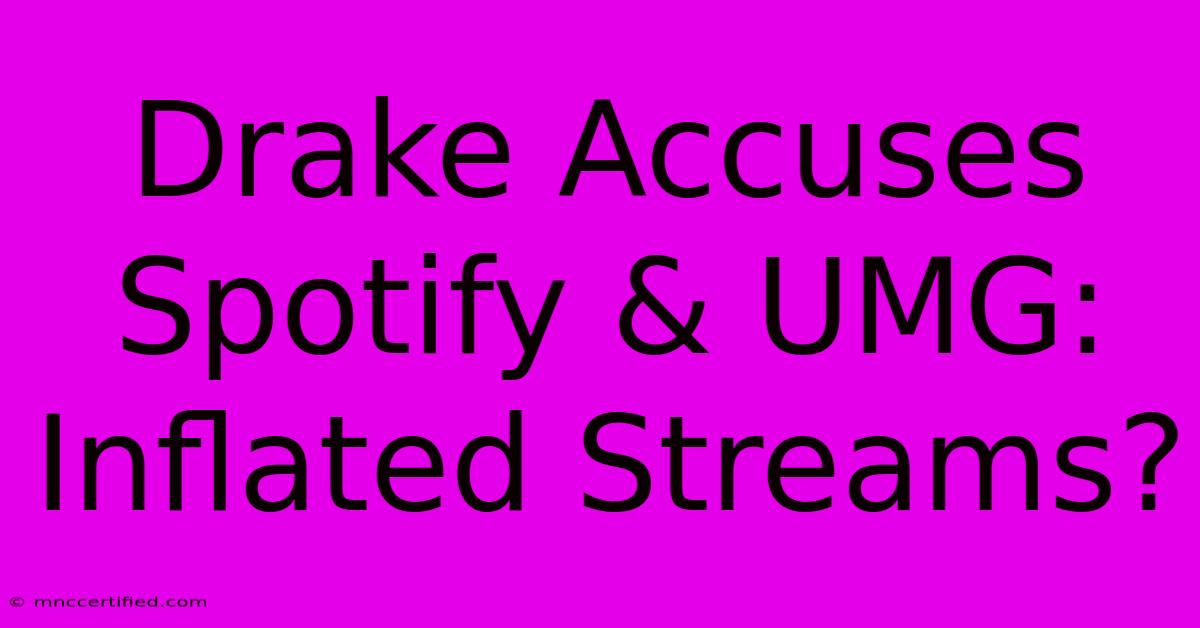Drake Accuses Spotify & UMG: Inflated Streams?

Table of Contents
Drake Accuses Spotify & UMG: Inflated Streams? Unraveling the Streaming Controversy
The music industry is buzzing with speculation following subtle yet significant accusations from Drake, a global superstar, targeting Spotify and Universal Music Group (UMG). While not explicitly stated as an accusation, Drake's recent actions hint at concerns regarding potentially inflated streaming numbers, raising crucial questions about the transparency and integrity of the streaming platform's metrics. This article delves into the controversy, examining the evidence, potential implications, and the broader impact on the music industry.
The Subtle Clues: Drake's Actions Speak Volumes
Drake's recent moves haven't been explicitly accusatory, but they're certainly raising eyebrows within the industry. The removal of his extensive catalog from Spotify playlists, coupled with his strategic releases on other platforms, suggests a deliberate attempt to influence the narrative around his streaming numbers and potentially highlight discrepancies. While he hasn't publicly commented directly on stream manipulation, the timing and nature of his actions are fueling the speculation. This strategic move underscores a deep-seated concern about the accuracy of the data reported by the streaming giants.
The Power of Perception: Impact on Artist Compensation
At the heart of this controversy lies the issue of artist compensation. Streaming royalties are calculated based on the number of streams, so inflated numbers directly impact the revenue artists receive. If Drake suspects that his streams have been artificially inflated, it implies he believes he's been underpaid – a significant issue for an artist of his caliber. This situation highlights a critical vulnerability within the current streaming model, prompting discussions about better transparency and accountability.
Spotify and UMG: Responding to the Allegations
Neither Spotify nor UMG have issued direct responses addressing Drake's implied accusations. However, the silence itself speaks volumes and fuels further speculation. The lack of a clear and concise rebuttal allows the narrative to grow, potentially damaging the reputation of both companies. A swift and transparent response would be crucial in mitigating further damage and restoring public trust. This silence underscores a critical need for clearer communication protocols between streaming platforms and artists.
The Broader Implications: Transparency and Trust in the Streaming Era
This controversy extends beyond Drake's individual experience. It sheds light on a larger problem within the digital music landscape: the lack of transparency regarding streaming metrics. The opaque nature of these algorithms allows for potential manipulation, raising ethical and financial concerns for artists of all sizes. This incident highlights the urgent need for more robust auditing systems and greater transparency in how streaming data is collected and reported.
The Future of Streaming: Demand for Accountability
The music industry is increasingly relying on streaming platforms for revenue. This reliance underscores the necessity for greater accountability and transparency. Artists, particularly independent artists, are vulnerable to inaccuracies in streaming data. The need for a unified system of verified metrics becomes critical to ensure fair compensation and to promote a healthier relationship between artists and platforms.
SEO Keywords: Drake Spotify Streams, UMG Controversy, Inflated Streaming Numbers, Music Industry Transparency, Artist Compensation, Streaming Royalties, Drake Music, Spotify Algorithm, Universal Music Group.
This article aims to provide a comprehensive overview of the ongoing controversy surrounding Drake, Spotify, and UMG. It addresses the core issue of potential stream inflation, its impact on artist compensation, and the broader implications for the music industry's future. By examining the situation from multiple perspectives, it fosters a more nuanced understanding of the complexities involved in the digital music landscape. Further investigation and industry-wide reform are necessary to address these concerns and ensure a fairer and more transparent system for artists.

Thank you for visiting our website wich cover about Drake Accuses Spotify & UMG: Inflated Streams?. We hope the information provided has been useful to you. Feel free to contact us if you have any questions or need further assistance. See you next time and dont miss to bookmark.
Featured Posts
-
Soas National Library Partner On Nusantara Manuscripts
Nov 26, 2024
-
Microsoft 365 Down Heres The Update
Nov 26, 2024
-
Homeowners Insurance Truckee Ca
Nov 26, 2024
-
Bodie Essentials Of Investments
Nov 26, 2024
-
Ronaldos Impact Al Nassr Eyes Asian Cl
Nov 26, 2024